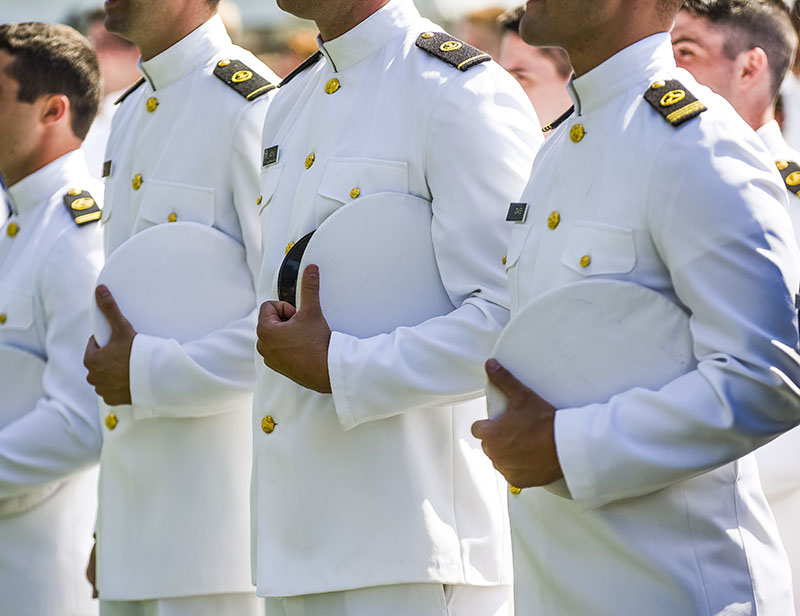Sea Year training is resuming in March for midshipmen at the U.S. Merchant Marine Academy, with the announcement Wednesday that three commercial operators have met the requirements for new policies against sexual harassment.
Crowley Maritime Corp., Maersk Line Ltd., and American President Lines (APL) are the first to meet the new policies mandated in 2016 by the U.S. Maritime Administration. The three companies provided half the placements for the academy’s commercial Sea Year program before it was suspended last June.
Marad is reviewing plans from other companies “to combat sexual assault, sexual harassment and other coercive behaviors,” said Joel Szabat, Marad executive director, in announcing the return. “Commercial Sea Year training is a core training component of the academy and its midshipmen, and critical to the success of the industry, as today’s midshipmen are tomorrow’s operators.”
Five additional shipping companies are in line to rejoin the program, according to the USMMA Alumni Association and Foundation. The alumni association pushed hard for reinstating Sea Year, and expectations were high that incoming Secretary of Transportation Elaine Chao would expedite the restart. The association urged getting the other companies on board as soon as possible.
“Until there is an available berth for every midshipman to train aboard commercial vessels, the academy will continue to fall short in meeting its mission,” said Capt. James Tobin, president of the alumni association. “We nevertheless applaud Secretary Chao’s decisive action, and we look forward to working with the academy, Maritime Administration and Department of Transportation to ensure we meet the ultimate goal of full restoration in a timely manner.”
Chao’s DOT predecessor Anthony Foxx directed USMMA to suspend midshipmen training on commercial vessels — the decision was announced at the academy’s June commencement ceremonies — culminating critical reports that examined complaints of sexual harassment and assault on ships and at the academy’s Kings Point, N.Y., campus.
Marad officials convened a summit with industry and labor to talk about the problems and the need for what they called zero tolerance harassment policies – prompting extended debate too in the industry and among USMMA students and alumni.
Working with Marad, companies and unions developed those requirements for providing training opportunities for midshipmen, including zero tolerance for sexual assault sexual harassment, vetted mentors, regular crew training, and no-fraternization rules between crew and midshipmen.
The programs will be reviewed after the first six months of the 2017 Sea Year, and the annually. Meanwhile, an industry-labor consortium is working with Marad to develop computer based training programs and best practices to present sexual assault and harassment. A report is due to Congress in September 2017, under a provision that was inserted into the annual National Defense Authorization Act.
In late January the alumni association announced the formation of an advisory committee to help MARAD and academy administrators with another pressing problem: the school's imperiled accreditation.
As the decision was coming to suspend Sea Year last June the Middle States Commission on Higher Education found USMMA had underperformed in five of 14 areas judged as part of the accreditation process.
Those shortfalls included planning, leadership and governance, administrative staff qualifications, resource allocation and student services. Ten Middle States-reviewed schools are on warning status, but of those only USMMA failed in more than two categories.
USMMA is the first federal service academy to be ever be placed on warning, and it must provide a progress report to Middle States commission by March 1 on how it is implemented the required improvements.
“If we don't fix the accreditation, then nothing else matters,” said Tobin the alumni president. “This is an existential threat to the institution and therefore a long-term threat to our national security.”
The committee’s tasks include:
- Developing a comprehensive overview of MSCHE's expectations and requirements for re-accreditation.
- Outlining accreditation best practices executed by other federal service academies, in particular the U.S. Naval Academy.
- Drawing on case studies of schools that have previously been placed on warning to identify the concrete steps that will ensure re-accreditation.
The advisory committee includes several USMMA graduates, including Bob Comegys, vice president and corporate ocean cargo underwriting line manager with Starr Indemnity and Liability Company; Connie Dato English, director, global talent acquisition, CFA Institute; Victoria Millar Ferguson, senior engineering instructor with Exelon Nuclear and a 2013-2016 assistant professor, assistant women's lacrosse coach and Sexual Assault Prevention and Response Program victim advocate at the academy; James Fitzpatrick, marine transportation professor and department chair at the Massachusetts Maritime Academy, who will chair the advisory committee; and David Steinberg, former president, Long Island University. Steinberg also served as vice president and university secretary at Brandeis University and on the board of trustees for the Commission on Independent Colleges and Universities.




